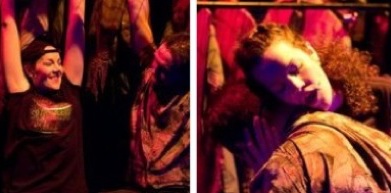Ben Glover reviews Spangled by Mercury Theatre Wales, at The Riverfront, a boundary-breaking production about the 1990’s club scene.
There is a beat – a muffled, distorted beat. I stand outside in the unromantic world of vivid reality, waiting for the approval of the unceasingly indifferent door staff. As the queue diminishes and I edge closer and closer to the moment of discovery, a nervous tension descends, a silence only penetrated by the progressively louder beat. The music is now clearly defined and beautifully intoxicating. The critical examination of the door staff is not enough to trouble the heightened sense of anticipation. The beat is continuous. It shapes my movements, it controls my gait. The explosion of every sense only heightens the experience; I can feel the beat regulating my breathing whilst the lights linger on the smoky atmosphere creating a cocktail of cascading colour in which silhouetted dancing figures flow to the music. My heart chases the quickening beat and time flies. Adrenalin fuelled and chemically enhanced, the dance floor writhes in unison with bonds of unexplained empathy to a climax of euphoric exhaustion. Then the beat stops. Reality and light invade the warm cocoon of clubbing, but one thing is certain, you will never be the same again.
Given that clubbing is such a primitively hedonistic experience, a question arises; is it possible to capture and transpose these raw emotions to a theatre production?
There seems to be a consistent trend to revisit music genres twenty years after their initial popularity. Whether it is a generation wishing to recover a part of their lost ideological youth or a new audience that are keen to discover the roots of contemporary music; every musical trend has at least one rebirth and one last day in the sun. Mercury Theatre Wales’ production Spangled is one such retrospective view of the clubbing music scene. Set in Cardiff in 1993, Spangled is an interwoven, ensemble piece in which the characters are drawn from the real life memories of the people involved with clubbing culture. Spangled follows in quick succession from Kieran Hurley’s award winning Beats production, a monologue based on his experiences of clubbing and the Criminal Justice Act in 1994.
From the beginning of Spangled it is obvious that this is not a traditional theatre production; interactivity between the audience and the set is encouraged as the cast continually play with the solidity of the fourth wall. Every effort has been made to transform the conventionally designed theatre to a fully functioning club – the removal of seats and the construction of a podium, a DJ booth, a chill out room, cloakroom and bar area are more familiar to clubbers than to a stereotypical theatre audience. The intelligence of Bethan Morgan’s (Director) design is that this forces the audience to become part of the play itself, immersing everyone into the sights and sounds of early club culture.
The story is told from the perspective of the six main protagonists, all of whom have their own unique point of view of the clubbing scene. For Angel (Sian Davies) and her friend Donna (Holly Fry), the club is pure, unadulterated escapism from a world full of banality and drudgery. For Steve (Jason May), Angel’s step father, the club symbolises opportunity, the chance to earn money and respect. For Gary (Rhys Downing) and his friend Sean (Jason Marc-Williams), the club offers a chance to glimpse a different life, away from the traditional night out in a rugby club in the valleys. Finally, the club, for DJ Johnny (Lee Mengo), has ceased to be an opportunity or an escape, but a millstone upon which he ponders the consequences of his actions and age.
In this intensely physical production, all the performances are well acted and engaging, with special mention to Holly Fry and Lee Mengo for their compelling interaction and believable chemistry. Plus the manipulation of space, original music and innovative set design are also to be commended and really add to the sense of submersion into the 1993 clubbing scene. Furthermore, the use of DJ Jimpy playing a DJ set around the dialogue was an especially fun and creative aspect to this production.
However, for all the experimentation with creating an atmosphere, Spangled sadly has some noticeable shortcomings. The lack of narrative is possibly the most significant. It seems that the real life experiences of people involved in the club scene have just been transposed from the page, with little thought for the direction and development of the production. Also, some of the dialogue appears to be forced and clunky, as a character’s motivations are rushed to be over-explained, causing a loss of rhythm and pace. Consequently, as Spangled progresses, the characters that are presented to us are too often one-dimensional and lacking in genuine pathos. The revelations about some of the character’s lives, such as Gary’s need for respect from Angel and Steve’s misogyny, seem to act as tools to keep our attention rather than actual story arcs that develop our understanding of the character and their situation.
Despite these drawbacks, and possibly for the wrong reasons, Spangled was still an enjoyable experience, to which Mercury Theatre Wales should be commended for experimenting with the boundaries of traditional theatre production. Where Spangled does succeed is in creating the atmosphere and essence of a club night which is a genuinely difficult task, from dungarees to whoop-whoops as the beat builds, it was possible to imagine being back in a club in the 1990s.
You might also like…
Jafar Iqbal reviews As Long as the Heart Beats, part of National Theatre Wales’ NHS70 programme, celebrating the NHS.
Ben Glover is the managing editor of Wales Arts Review.












